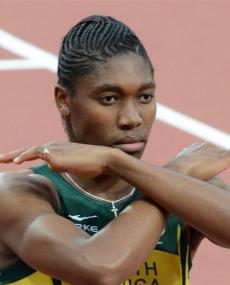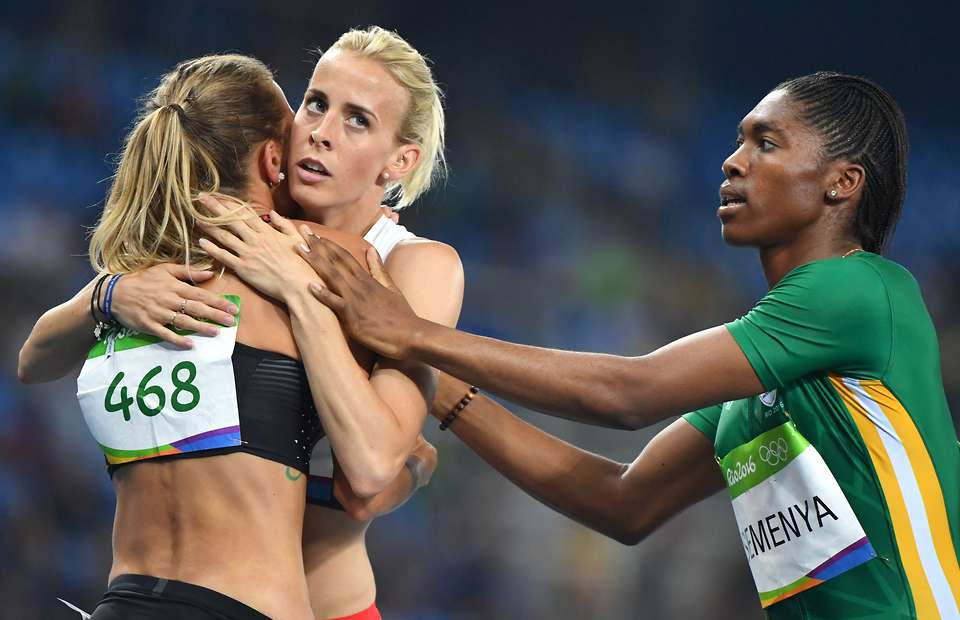
Mokgadi Caster Semenya was born on 7 January 1991 to her parents Dorus and Jacob Semenya. She was born in Ga-Masehlong, a village near Polokwane. As a child, Semenya went to live with her grandmother, Maputhi Sekgala in a nearby village.
Semenya played soccer at school and trained everyday after school, often running from village to village. Semenya attended Nthema Secondary School and later went on to study Sports Science at the University of North West.
In the African Junior Championships in 2009, Semenya won both the 800 meters (m) and 1500m races with the times of 1:56.72 and 4:08.01 respectively, simultaneously breaking the 800m Senior and Junior South African records held by Zelda Pretorius at 1:58.85, and Zola Budd at 2:00.90, respectively.
In August of the same year, when Semenya was 18 years old she won gold in the 800m World Championships with a time of 1:55.45 in the final, setting the fastest time of the year.
Semenya began to receive widespread acclaim, also being voted Track and Field News number one women's 800m runner of 2009.
However, the public attention she received was highly charged with controversy about her sexual identity and she was forced into being the centre of a public debate about hyperandrogeny, or high levels of testosterone in female athletes, in women's sport.
Historically, after World War II, the International Olympic Committee (IOC) made requirements that each nation certify that its women Olympic athletes were female. A short-lived and controversial policy was implemented, whereby a visual inspection of the genitalia of female Olympians by a panel of physicians took place. Infamously called the “nude parade”. In 1966, the International Association of Athletics Federation (IAAF) instigated a chromosome-based test instead, called the Barr-body test, in which a cheek swab was used to detect the presence of a y chromosome, and any female athlete who “failed” this test was required to leave the sporting world.
This test stood unchallenged until Maria Jose Martinez Patino challenged it after failing the test at the 1985 World Student games. Maria's hyperandrogenic status was subsequently released by a doctor causing her devastation in her career and personal life. Albert de La Chappelle and Arne Ljungqvist, used studies and public arguments to convince the world that Patino's Androgen Insensitivity Syndrome (AIS) – a condition in which the body is unable to utilize the testosterone in the bloodstream – meant that she held no significant competitive advantage over other women.
The IAAF and the IOC subsequently abandoned chromosome-based gender testing, and replaced it with a less invasive method. This method was brought to international scrutiny after Semenya rocked the sports world by winning the 2009 IAAF World championship 800 meter race by 2.5 seconds. The media attention which surrounded Semenya's case was unrelenting and what followed would affect Semenya on a very personal level.
In 2009, the IAAF implemented what it called, a 'gender verification test' on Semenya. The test’s name in itself is a misnomer as gender is a social construct and what was essentially being tested was her biological sex. However, biological sex is also a complex matter and the test works with testosterone which is present in all women and not necessarily indicative of a performance advantage. On 7 September 2009, Wilfred Daniels, Semenya's coach with Athletics South Africa (ASA), resigned because he felt that ASA “did not advise Ms. Semenya properly", and apologised for personally having failed to protect her.
In 2010, Semenya was denied opportunities to compete professionally as the IAAF had not yet released her results. On 6 July, the IAAF cleared Semenya to return to international competition. She returned to competition nine days later winning two minor races in Finland. On 22 August 2010, running on the same track as her World Championship victory, Semenya started slowly but finished strongly, dipping under 2:00 for the first time since the controversy.
Semenya did not enter the World Junior Championships or the African Championships, both held in July 2010, and opted to target the Commonwealth Games to be held in October 2010. She improved her season's best to 1:58.16 at the Notturna di Milano meeting in early September, but was forced to skip the Common Wealth Games due to injury.
In 2011, the IAAF officially implemented a new rule that only allowed women to compete if their testosterone level fell 'below the male range', which was worked out by averaging male athlete's testosterone scores. Semenya and other sportswomen who fell outside the accepted range for women, were forced to undergo Hormone Replacement Therapy (HRT) in order to compete in the sport.
The intense focus on Semenya has also brought issues of racism to the fore, as previous Women's World Championship competitors of Caucasian descent, and with similar 'masculine' characteristics have not brought on such widespread scrutiny and led directly to policy change.
At the 2011 World Championships, she easily won her semi-final heat. In the final, she remained in the front of the race, until she separated from the rest of the field followed by Mariya Savinova of Russia, who sprinted past Semenya before the finish line, leaving Semenya to finish third.
In 2012, Semenya was chosen to carry South Africa's flag during the opening ceremony of the 2012 Summer Olympics. She later won a silver medal in the women's 800 metres of these games, with a time of 1:57.23 seconds, her season's best. She came second to Savinova who took gold in the race, finishing 1.04 seconds before Semenya. In November 2015, the World Anti-Doping Agency recommended Savinova and four other Russian athletes be given a lifetime ban for doping violations at the Olympics. On 10 February 2017, the Court of Arbitration for Sport (CAS) officially disqualified Savinova's results backdated to July 2010 till August 2013, and she was stripped of all her titles during this time. Semenya was awarded with the win at the 2012 World Championships five years later as she placed second in the race and the silver medal from the 2011 World Championships in which she had previously finished third.
In 2015, Indian sprinter, Dutee Chand appealed against the rule of the implemented 'gender tests'. CAS ruled in favour of Chand, finding that there was no convincing scientific evidence that women with elevated testosterone levels had an “unfair” performance advantage over others.
The IAAF policy on high natural levels of testosterone in women was suspended and Semenya and others were no longer expected to undergo HRT.
On 16 April 2016, Semenya became the first person to win all three of the 400m, 800m, and 1 500m titles at the South African National Championships, setting world leading marks of 50.74 and 1:58.45 in the first two events, and a 4:10.93 in the 1500m, all within a nearly 4-hour span of each other.
On 16 July, she set a new national record for 800 meters of 1:55:33. On 20 August, she won the gold medal in the women's 800 meters at the Rio Olympics with a time of 1:55.28. Immediately after the race, Lynsey Sharp, finishing sixth, broke in tears on the rule change saying "Everyone can see it’s two separate races so there’s nothing I can do," while fifth-placed Joanna Józwik reportedly claimed that she was the "first European" and "second white" to finish the race.
In 2017, the IAAF is set to challenge the CAS ruling after they have been putting together a case since the ruling in 2015. The IAAF has conducted studies that allegedly prove hyperandrogynous women have a competitive advantage over other women. If they win their case, Semenya could be forced to undergo HRT again or could be excluded in other forms.
There is counter evidence that argues that high testosterone levels are not necessarily indicative a performance advantage, such as the Peter Sonksen and Daryl Adair study, in which they unexpectedly found in a study investigating the hormone profiles of female and male athletes: 16.5% of men had a testosterone level below the lower limit of the normal male reference range. Some were unmeasurably low. And 13.7% of the elite female athletes had a level higher than the upper limit of the normal reference range for women. Some were in the high male range. Thus, there was a complete overlap of testosterone levels between male and female elite athletes. This study challenges existing knowledge and the forced binaries on men and women athletes, that Semenya's very existence challenges in ways that intersect with her race and gender.
Semenya has had to learn to focus on her sportsmanship without getting drawn into the spectacle her life has become. Semenya still focuses on herself as an important public figure in South Africa. Offering inspiration to children and athletes coming from similar disadvantaged backgrounds, and occasionally appearing in publications to do interviews. She has co-partnered with Shamila Ramjawan, founder of FamRam Solutions to advocate for girls menstrual health and alleviate the serious issue of girls, especially in rural areas, missing school because of being unable to afford sanitary products while on their menstrual cycle. The product is called the PrincessD menstrual cup, also known as a moon-cup, and is being given out at schools.
On 8 January 2017, Semenya and her wife, Raseboya held a traditional white wedding.
Caster Semenya achieved gold and her personal best in 800 m of 1:55:17 at the 2017 World Championships held in London.
 Semenya is met with hostility when consoling Lynsey Sharp and fellow athlete after 800 m race in 2016 Rio World Championships, where Semenya won gold
Semenya is met with hostility when consoling Lynsey Sharp and fellow athlete after 800 m race in 2016 Rio World Championships, where Semenya won gold
 Semenya and Violet Raseboya get married in a traditional white wedding in 2017.
Semenya and Violet Raseboya get married in a traditional white wedding in 2017.